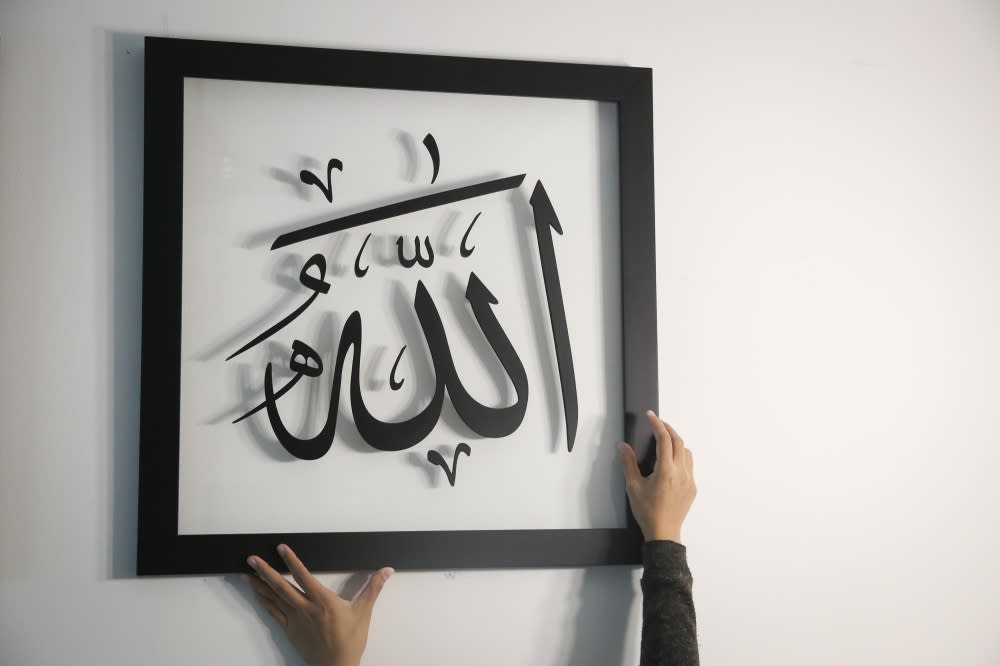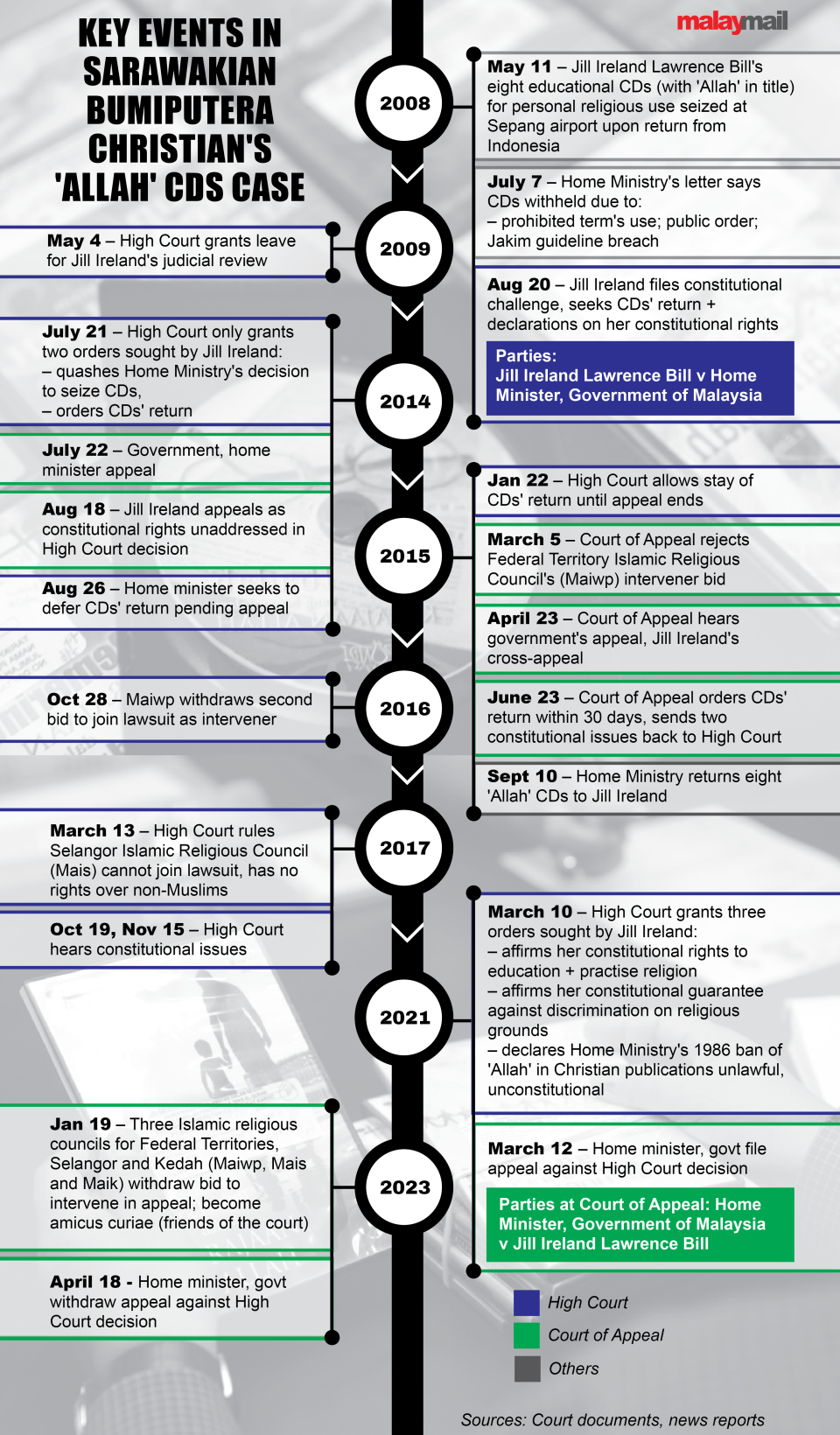MCCBCHST: Unconstitutional to ban ‘Allah’ use by non-Muslims in own faith without propagation to Muslims

KUALA LUMPUR, May 19 — Existing state laws in Malaysia that impose a blanket ban on the use of words such as “Allah” by non-Muslims — even for their own religion — were unconstitutional, an umbrella body representing major non-Muslim religions argued today.
This is because the Federal Constitution only allows states within Malaysia to restrict or control the spreading of religious beliefs among Muslims, the Malaysian Consultative Council of Buddhism, Christianity, Hinduism, Sikhism and Taoism (MCCBCHST) said.
The MCCBCHST said this meant state laws in Malaysia cannot ban non-Muslims from using words including “Allah”, in situations when non-Muslims did not use those words to spread religious beliefs to Muslims.
The Federal Constitution’s Article 11 guarantees the right of every person to profess and practise their religion, but Article 11(4) states that state governments can create laws to control the propagation or spreading of religious beliefs among Muslims: “State law and in respect of the Federal Territory, federal law may control or restrict the propagation of any religious doctrine or belief among persons professing the religion of Islam.”
Most states in Malaysia have made state laws or enactments under Article 11(4) to prohibit non-Muslims from using between 20 to 40 words, particularly under Section 9 of the respective state laws.
As Prime Minister Datuk Seri Anwar Ibrahim intends to submit a Cabinet proposal on the “Allah” issue to the Conference of Rulers, the MCCBCHST said this would be a good time to consider whether Section 9 of these state laws — which bans non-Muslims from using words like “Allah” — are constitutional.
The MCCBCHST said the Federal Constitution’s Article 11(4) will only allow state governments to prohibit usage of words by non-Muslims when there is propagation of religious beliefs to Muslims, and that there cannot be a ban when non-Muslims are merely using those words for themselves and without propagation to Muslims.
“Therefore, there has to be ‘propagation of any religious doctrine’ to Muslims to come within ambit of prohibition. Mere usage of words without Propagation to Muslims cannot come within Ambit of Article 11(4) of the Federal Constitution.
“In view of the above, the mere use of words for own learning without any propagation to Muslims cannot come within scope of Article 11(4). This, prima facie would mean that Section 9 of State Enactments which bans certain words even when there is no propagation involved will be unconstitutional and is beyond the power given by Article 11(4),” the MCCBCHST said in a statement today.
For example, MCCBCHST said the Selangor state government’s “Non-Islamic Religions (Control of Propagation Amongst Muslims) Enactment 1988 — which took effect on July 7, 1988 — bans non-Muslims from using 25 words including “Allah”, but argued that some of these banned words are part of everyday use and it would be unreasonable to prohibit such use.
The MCCBCHST said no other country in the world has banned the use of the word “Allah” by non-Muslims, and Perlis mufti Datuk Mohd Asri Zainul Abidin had in a viral video said that the word “Allah” predates Islam, does not have religious connotations, and has been politicised.
The MCCBCHST urged the Cabinet to consider its arguments that Section 9 of state laws in Malaysia — which prohibit words like “Allah” for non-Muslim religions — have gone beyond what is allowed under the Federal Constitution’s Article 11(4) and are unconstitutional.
“The MCCBCHST therefore appeals to the prime minister and the Cabinet to consider the constitutionality of Section 9 of the State enactments which have been shown above to be outside the scope of Article 11(4) and thus ultra-vires.
Saying that it firmly upholds the Federal Constitution and the Rukun Negara including the principle of the supremacy of the Federal Constitution, the MCCBCHST urged the government to protect Malaysians’ rights according to the Constitution.
“We further appeal to the honourable prime minister and the Cabinet to protect the rights of all in line with the Federal Constitution and to maintain that Section 9 of the State Enactments are unconstitutional. This will also be in line with Malaysia Madani which we as a nation aspire for,” it said.
The MCCBCHST statement was jointly signed by its president Jagir Singh, deputy president Dao Zhang Tan Hoe Chieow, vice president Archbishop Julian Leow Beng Kim, vice president Venerable Chuan Yuan, and vice president Ganesh Babu Rao.
There were three high-profile court cases involving the Malaysian government’s prohibition of the use of the word “Allah” by Christians, with the first involving the Home Ministry’s 2007 ban of the word “Allah” in the local Catholic church’s weekly paper Herald’s Bahasa Malaysia section meant for its Bahasa Malaysia-speaking church members.
The two other cases involved the Home Ministry’s 2007 seizure of Sabah church SIB’s three boxes of Christian educational materials containing the word “Allah” — which were not for sale and meant for the church’s children, and the government’s 2008 seizure of eight compact discs containing the word “Allah” — which were meant for personal religious use — from a Sarawakian Bumiputera Christian, Jill Ireland Lawrence Bill.
Malay Mail previously published a summary of how the three court cases were resolved.
The word “Allah” is Arabic for God and had been adopted into the Malay language, and had been used for generations and hundreds of years by Malay-speaking Christians in the country — especially natives of Sabah and Sarawak — in the practise of their religion and professing of their faith.




